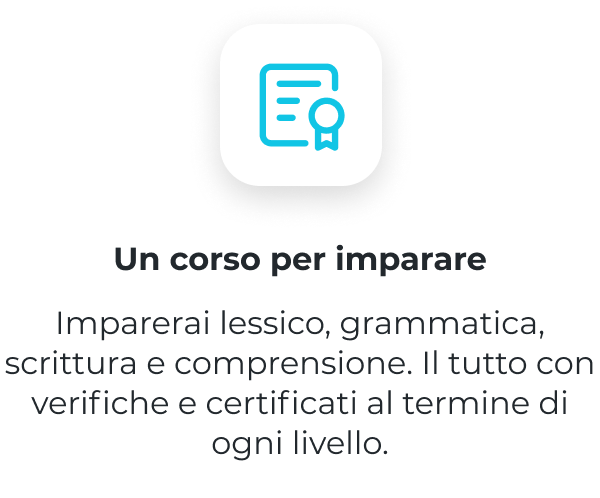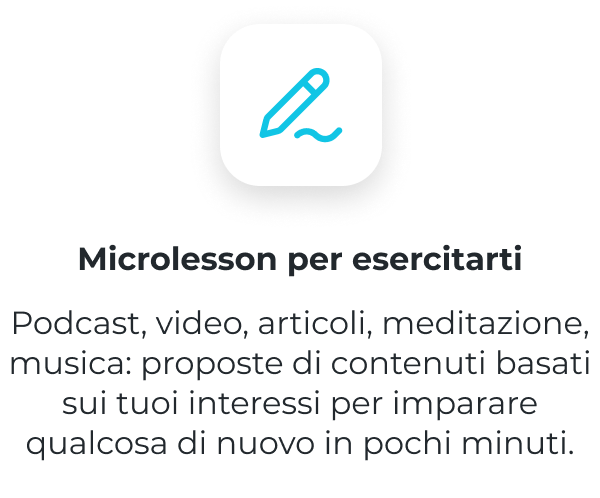Il verbo avere in inglese
Impara a usare il verbo to have, uno dei verbi più importanti in inglese. Iscriviti gratis ad ABA English e goditi una nuova video lezione di grammatica gratuita ogni giorno.
Quando si parla di verbi in inglese, generalmente il più comune e il più importante che citiamo è il verbo to be, tuttavia c’è anche un altro verbo molto importante che viene utilizzato in vari tempi verbali, il verbo to have.
To have è un verbo irregolare che significa “avere”. È anche usato come verbo ausiliare nella formazione di tempi verbali al perfect, come il past perfect simple o il past perfect continuous. ABA English insegna tutto quello che c’è da sapere su questo verbo e su come usarlo senza errori, basta dare un’occhiata a questo articolo.
Coniugazione del verbo avere in inglese
Come accennato in precedenza, il verbo to have è un verbo irregolare, quindi non segue le comuni regole di coniugazione dei verbi in inglese. Vediamo di seguito la coniugazione del verbo to have nei tempi verbali più comuni.
| Present Simple | Present Continuous |
| I have You have He/She/It has We have You have They have | I am having You are having He/She/It is having We are having You are having They are having |
| Past Simple | Past Continuous |
| I had You had He/She/It had We had You had They had | I was having You were having He/She/It was having We were having You were having They were having |
| Future Simple | Future Continuous |
| I will have You will have He/She/It will have We will have You will have They will have | I will be having You will be having He/She/It will be having We will be having You will be having They will be having |
+30 MILIONI DI STUDENTI
Unisciti all’accademia digitale d’inglese più
grande del mondo e impara l’inglese
Verbo to have como ausiliare
Come sai, l’inglese ha diversi verbi ausiliari che vengono comunemente usati per formare diversi tempi verbali. Nel caso del verbo to have, questo è un verbo ausiliare che aiuta a formare i tempi verbali al perfect come present perfect simple, past perfect simple, past perfect continuo, ecc.
Per formare i tempi al perfect simple, dobbiamo usare il verbo to have al passato, presente o futuro (a seconda del tempo che stiamo usando) e il verbo principale al participio. Nei casi di tempi verbali continuous, useremo il verbo to have di nuovo al passato, presente o futuro, il verbo to be al participio passato been e il verbo principale al gerundio.
Guarda la tabella qui sotto con tutti i tempi verbali al perfect nei quali il verbo to do è usato come ausiliare. Qui usiamo il verbo to do (fare) per illustrare l’uso dei verbi al participio e gerundio insieme al verbo to have:
| Present Perfect | Present Perfect Continuous |
| I have done You have done He/She/It has done We have done You have done They have done | I have been doing You have been doing He/She/It has been doing We have been doing You have been doing They have been doing |
| Past Perfect | Past Perfect Continuous |
| I had done You had done He/She/It had done We had done You had done They had done | I had been doing You had been doing He/She/It had been doing We had been doing You had been doing They had been doing |
| Future Perfect | Future Perfect Continuous |
| I will have done You will have done He/She/It will have done We will have done You will have done They will have done | I will have been doing You will have been doing He/She/It will have been doing We will have been doing You will have been doing They will have been doing |
Ricorda che il verbo to have può apparire anche come ausiliare e come verbo principale nei tempi al perfect:
- I had had a coffee before lunch. (Avevo preso un caffè prima di pranzo.)
- She had been having extra classes after school. (Lei aveva preso lezioni extra dopo la scuola.)
Esempi di utilizzo del verbo avere in inglese
Ora che conosci le diverse coniugazioni del verbo to have, vediamo alcuni esempi pratici del suo utilizzo:
Verb to have al Present Simple
- I have many friends from childhood. (Ho molti amici d’infanzia.)
Verb to have al Past Simple
- She had 3 apples in her bag but lost 2 on the way home. (Lei aveva 3 mele nella sua borsa, ma ne ha perse 2 tornando a casa.)
Verb to have al Future Simple
- They will have a beautiful summer wedding. (Avranno un bellissimo matrimonio estivo.)
Verb to have al Present Perfect
- I have done nothing wrong. (Non ho fatto niente di male.)
Verb to have al Past Perfect
- We had gone to the movies after dinner. (Eravamo andati al cinema dopo cena.)
Verb to have al Past Perfect Continuous
- I had been watching TV when my mom came home from work. (Stavo guardando la televisione quando mia madre tornò a casa dal lavoro.)
Consigli per coniugare il verbo to have
Come tutti sappiamo, la pratica rende perfetti. Con il verbo to have è lo stesso. Vediamo di seguito alcuni consigli per approfondire le tue conoscenze:
- Scrivi frasi diverse con tempi verbali diversi per esercitarti nell’uso del verbo to have.
- Leggi testi, libri o articoli e sottolinea il verbo to have ogni volta che lo trovi e identifica quale tempo viene utilizzato.
- Ripeti ad alta voce le frasi usando il verbo to have, principalmente alla terza persona e al passato quando il verbo è irregolare, in modo da abituarti all’uso orale del verbo.
Sai già qual è il tuo livello d’inglese?
Fai subito un test
Registrati nella nostra pagina e accedi gratuitamente al test di livello. Scoprirai il tuo punto di partenza in pochi minuti e potrai continuare ad avanzare con il corso.

Esercizi per praticare il verbo avere in inglese
Ora che conosci tutti gli usi del verbo to have, riempi gli spazi vuoti con il verbo to have secondo il tempo indicato e il verbo principale:
- I __________ the chicken for dinner. (Future Simple – to have) (Mangerò pollo per cena.)
- We _______________________ the plans when Mary joined us. (Past Perfect Continuous – to discuss) (Stavamo discutendo dei piani quando Mary si unì a noi.)
- If they ______________ before, we wouldn’t be here now. (Past Perfect – to talk) (Se loro avessero parlato prima, non saremmo qui.)
- She _____ four sisters. It’s a big family. (Present Simple – to have) (Lei ha quattro sorelle. È una grande famiglia.)
- You ______________ a hard day on your birthday. (Past Continuous – to have) (Stavi passando una brutta giornata per il tuo compleanno.)
Risposte: 1. will have; 2. had been discussing; 3. had talked; 4. has; 5. were having.
Altri link utili


























